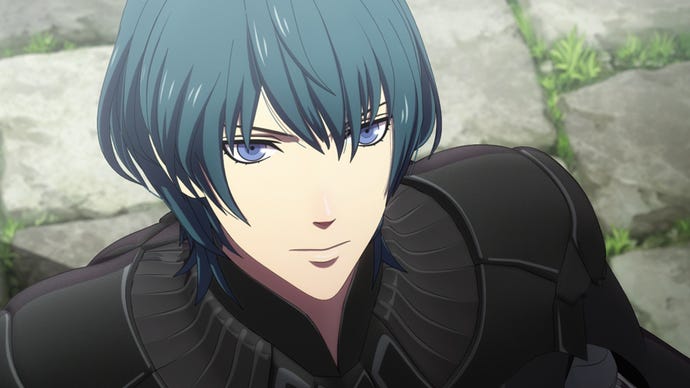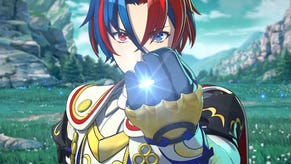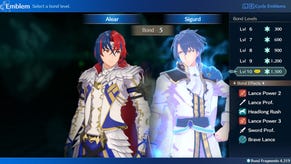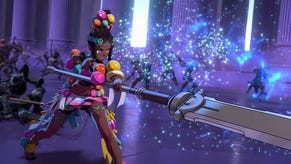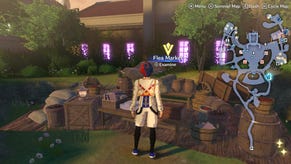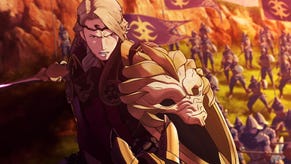Fire Emblem: Three Houses guide: tips for your time at the monastery and beyond
Fire Emblem: Three Houses is a huge adventure with a lot to do - in fact, it can initially be a little bit overwhelming. These tips should help beginners get situated.
Before you settle in and get ready to spend as many as 80 hours doing battle, making friends and teaching plucky students in the excellent Fire Emblem: Three Houses, you might want a bit of advice. On this page we've curated some tips based on our hundred-plus hours with the game - things you might want to consider or remember as you begin your journey as a professor at the monastery.
For our money, Classic Mode is still the way to play
I absolutely hate to do this, because difficulty should always be the player's choice - and it of course still is - but I feel compelled to note that Fire Emblem really does come alive when you play it on the 'Classic' mode.
In addition to typical difficulty settings, Fire Emblem: Three Houses also gives players the choice between Classic Mode and Casual Mode. Casual Mode was introduced a few games ago in Awakening, and the difference is pretty simple: when a unit dies in Casual Mode, it's a temporary thing. They're removed from the battle, but will return to be used again later. In Classic Mode, when a unit dies they are gone forever, and that has wide-reaching repercussions. Classic Mode is how Fire Emblem was first envisioned, thus the name, but Casual Mode is something added later to make the series more accessible. Casual Mode is a great addition, too, but in Three Houses there's another interesting mechanic tied to all this: Divine Pulse.
Divine Pulse is essentially a rewind function in battle, allowing you to undo costly moves or even wind back a whole turn or two if a battle strategy really isn't panning out. This allows you the best of both worlds even on Classic Mode: you can use Divine Pulse to rescue a unit from permanent death and rethink things if they go wrong, but given that Divine Pulse is a limited-use mechanic, you still then have the genuine threat and menace of permanent death, which really gives Fire Emblem's strategic battles some teeth. Think about it.
Which house should you choose? Don't sweat it too much
Very early on in the game, you're given a choice between the titular three houses: there's Edelgard and the Black Eagles (Red), Claude and the Leicester Alliance (Yellow) or Dimitri and his Blue Lions (Blue, unsurprisingly). It's true that this choice will follow you all game - but still, after experiencing the game on a few different paths, we'd advise not worrying about your initial house choice too much.
The story of Fire Emblem Three Houses branches more than you'd think - as well as this initial choice, you'll have countless choices to consider, some of them specific to the house in question. We don't have any particular advice on which house to choose, either - each has their own positive and negatives in a narrative sense, and all are more-or-less equal in terms of combat and actual play. Chat to the three house leaders and consider the members of each house, and make your decision based on that. Remember that with a bit of effort and persistence you can recruit many house members to poach them for a different side - so it's mainly the leaders and their tight inner circle you should consider.
Finally, if you're a completionist, remember that Fire Emblem: Three Houses has a solid New Game Plus mode - and it's pretty much designed to allow players to experience the alternate story paths more quickly.
When you're set loose in the monastery, explore and talk to everybody before undertaking activities
A big part of Fire Emblem: Three Houses is the beefed-up RPG section of the game which is significantly bolstered by how the game lets you loose in the monastery - part boarding school for nobles and warriors, part place of worship. There's a lot of stuff to do in the monastery - you can go fishing, peruse shops, chat to the students and faculty, scan amiibo at the gazebo and pick up rewards, or simply explore - as it's quite large and every time you have a chance to explore there'll be some assorted loot scattered around.
A 'time' mechanic is in place in the monastery, where actions that take a significant amount of time use up an action point, and you only have a limited number of those on any given day (though how many changes as your character grows). It's easy to focus your efforts on these tasks that take time, like training or hanging out with some of your students and squad mates, but don't merely focus on that.
Instead, take time to explore the monastery and pick up loot, to scan a few amiibo daily, and to chat to the people you see around, even those not in your house. Doing these tasks and others like them is 'free' in terms of time and action points spent, but it can provide valuable experience points and more notably some serious story intrigue. Milk your time in the monastery for all it's worth.
Try to think ahead on what each character should specialize in, and then be focused
One of the best things about Fire Emblem: Three Houses is how open-ended it is with regards to character skills and progress. Also, one of the potential worst things about Fire Emblem: Three Houses is how open-ended it is about character skills and progress.
Basically, because anybody can be eventually crafted and directed to be anything, you can sometimes drown yourself in choice. You're better off with multiple characters who are absolute experts at a couple of things rather than a bunch of fighters who are all a jack of all trades. As such, you should plan ahead.
Every character has things they naturally specialize in, but you can spec away from that as you wish - but just plan so time and experience points aren't wasted teaching skills you won't later use. Within these parameters, don't be afraid to take certification exams to change class option - many classes have skill overlaps that'll still allow you to hop around.
Don't sleep on battalions - they offer valuable benefits
The battalion system is an all-new addition for Fire Emblem: Three Houses, and though it changes the look of battles by having each named unit command a squad of anonymous grunts rather than them simply fighting alone, it also has some in-game benefits. You won't unlock the battalions until several in-game weeks into the story, but once it's unlocked you should spend the cash and equip a battalion on every squad member available to you.
As well as unlocking the very handy gambit actions for the unit they're assigned to, battalions can also boost the stats of the unit they're commanded by, and commanding a battalion in a skirmish will also slowly but surely raise that unit's authority skill, something that determines some character recruitment as well as hiring further battalions.
Don't forget to stop by the battalion point in the marketplace of the monastery every time you explore, too - use that to see what new units have unlocked and also replenish the ones you regularly use to full strength.
Double check your assigned skills often - you might be missing out
This is linked to our earlier point about choosing a path for each character to take in terms of their class and abilities early on - you should check your skills often. Skills are acquired on a class basis as you level each class up, but those skills are portable, meaning they can be used on a different class setup to the one they were earned in.
The game will automatically equip skills, but it isn't always what'll be best for your current choice, class or play style. So be sure to access the skills sub-section of the inventory menu to check what each character has assigned regularly - it might even save your bacon in battle.
Don't forget to repair your weapons, and occasionally enhance
Weapon degredation is a big thing in the Fire Emblem series, with every weapon having a durability stat that will slowly tick away with every use. It might be tempting to simply let weapons break, but the smart player will actually instead repair them, which can be done at the blacksmith either at the monastery or through the menus.
Not all weapons in There Houses will be for sale brand new, for one, but also repairing weapons once they're close to expiring works out a fair bit cheaper than letting it break and buying a replacement. Once you're in the groove of repairing weapons as a matter of course, then consider upgrading some weapons to make them even better in the same menu - just make sure you don't let those upgraded ones break!
